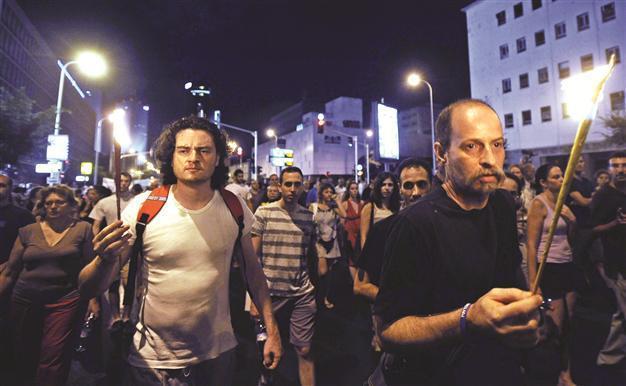Second Israeli sets himself on fire in economic woes protest
JERUSALEM

Holding torches during a demonstration in Tel Aviv, Israelis mourn Moshe Silman, an Israeli protester who set himself alight during a social justice demonstration on July 14. Silman died at hospital on July 20. AFP photo
A wheelchair-bound Israeli veteran, who set himself alight over the spiraling cost of living, died of his injuries, medics said yesterday, raising to two the number of Israelis who have died in such protests as a senior Israeli official warned that “things do not look good for the Israeli and world economies.”
A spokesman for Tel HaShomer hospital near Tel Aviv said Akiva Mafi, 45, died of injuries sustained on July 22, in a development two days after the government voted through a harsh package of austerity measures likely to further hit the underprivileged. “Akiva Mafi has died as a result of his burns,” Agence France-Presse quoted a spokesman for the hospital as saying on Israel’s army radio.
Mafi sustained burns on 80 percent of his body after he doused himself in petrol and set himself alight as he waited for an early morning bus, just two days after the death of a man who set himself on fire a week earlier during a mass protest against the cost of living. Moshe Silman, who died on July 20, was the first Israeli to take such an extreme step in a move which has prompted at least six copycat actions.
On July 29, Israel approved a package of sweeping austerity measures it said were essential to cut the budget deficit and shield the economy from crises which have rocked other economies. Central to the plan are hikes in income and sales taxes, as well as a 700-million-shekel ($171-million) cut to the 2012 state budget. The steps are likely to increase already widespread anger over the soaring cost of living in the Jewish state, which saw mass protests sweeping the country last summer. There have been renewed protests this year.
Meanwhile, BOI governor tells Knesset Finance C’tee to pass Netanyahu’s tax increases, budget cuts to shield economy from potentially severe European recession, global stagnation.
Bank of Israel governor, Stanley Fischer, told the Knesset Finance Committee yesterday that things do not look good for the Israeli and world economies, calling on the government to pass Prime Minister Benjamin Netanyahu’s controversial fiscal package of tax increases and budget cuts in preparation.
Not good picture“The facts are that things do not look good. There is a not small probability of a severe recession in Europe, and if that happens, it will affect us,” Fischer said. “We see growth forecasts for the U.S. of just 2 percent. Europe is in a recession, and there will be very weak recovery next year,” Fischer said, predicting that Israeli exports would be weak for several years to come.
Fischer said that Israel currently pays 4 percent of GDP a year on interest for previously issued bonds, saying that reducing the deficit would lower this interest rate. “This amounts to about NIS 40 billion. With this money, we could do many things, which is why we must not let the interest rate rise,” he said. “If the money does not come in, we’ll have to take more measures. It’s very easy to say, ‘it will be all right’, especially before elections, but it is very responsible to deal with the problem now, especially when we’re talking about a structural problem like the deficit,” Fischer continued, adding emphasis to the issues of trapped profits and stricter tax collection.
Fischer criticized calls for increasing the deficit, which would leave people with a lower tax burden and provide more government benefits, saying: “We’ve already raised the deficit. This increases the burden on the following generations.” The 2013 deficit, he said, would reach 4.5 percent of GDP if taxes are not raised, and may even pass 6 percent thereafter.
Tax, customs accord reached
RAMALLAH – The Associated Press
The Israeli and Palestinian officials said that they have reached a deal on improving Israel’s collection of customs and taxes on behalf of the Palestinians. The deal could help ease the Palestinians’ deep financial crisis, though there were no estimates of how much additional revenue it would bring.
It was reached after months of talks and came despite distrust between the two sides on many issues, including terms for resuming negotiations on Palestinian statehood and peace. Israel’s monthly transfers of about 500 million shekels ($125 million) are a key source of income for the Palestinian self-rule government. However, the Palestinians believe they are losing revenue because of underreporting.
